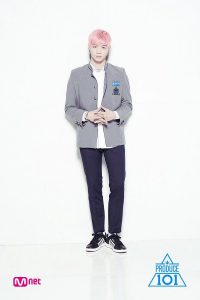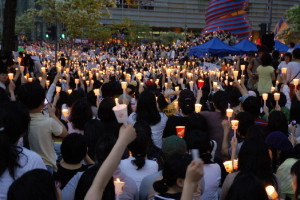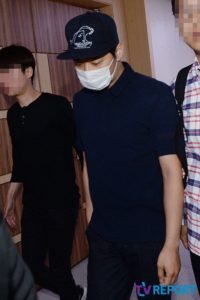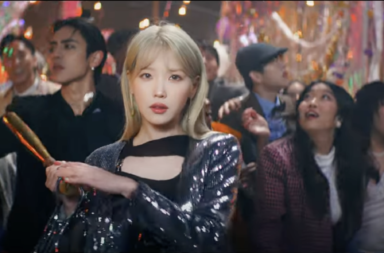 Last week, SM Entertainment announced the agency would be taking legal action against malicious commenters who were spreading false rumours about their artists. Announcements like this are not out of the ordinary for SM, or indeed any other South Korean entertainment agency. In the last few months, MMO Entertainment has filed a lawsuit concerning Daniel and Jisung. Fellow Wanna One group member, Jinyoung opened a similar case after numerous sexually inappropriate comments were circulated on social media. A Pink’s agency, Plan A Entertainment, announced similar plans in April after Naeun’s sister was made the target of sexual harassment. In 2015, LOEN Entertainment won a case on behalf of IU against 11 malicious commenters who were fined an undisclosed amount.
Last week, SM Entertainment announced the agency would be taking legal action against malicious commenters who were spreading false rumours about their artists. Announcements like this are not out of the ordinary for SM, or indeed any other South Korean entertainment agency. In the last few months, MMO Entertainment has filed a lawsuit concerning Daniel and Jisung. Fellow Wanna One group member, Jinyoung opened a similar case after numerous sexually inappropriate comments were circulated on social media. A Pink’s agency, Plan A Entertainment, announced similar plans in April after Naeun’s sister was made the target of sexual harassment. In 2015, LOEN Entertainment won a case on behalf of IU against 11 malicious commenters who were fined an undisclosed amount.
The first instinct when reading these kinds of accounts is to side with entertainment companies and the police, but the whole story is more grey than black and white. These kinds of cases are not unique in Korean society but the laws that are used to target internet harassment are more tailored to protect reputations and business interests than to safeguard people’s rights. The Korean Internet Safety Commission (KISOM) flagged cyber violence as a growing social problem for the country and found 14 percent of elementary, middle, and high school students have committed acts of cyber violence. The UN report on Cyber Violence Against Women and Girls reported 72 percent of women in South Korea felt they could not express their opinions safely online.
 The problem is compounded when considering its scale. As of the 2011 census, almost 82 percent of the South Korean population is connected to the internet: a number that is now estimated to be over 90 percent. The country has the fastest average internet speed in the world. South Korea is also estimated to have the highest active social media penetration in Asian countries. It’s simply not an option to go offline, particularly if your job depends on some social media presence, as with celebrities. Internet harassment has been used as a reason for tightening up internet restrictions and pursuing litigation against online detractors. The problem comes in when tracking how the restrictions have been implemented and to what end.
The problem is compounded when considering its scale. As of the 2011 census, almost 82 percent of the South Korean population is connected to the internet: a number that is now estimated to be over 90 percent. The country has the fastest average internet speed in the world. South Korea is also estimated to have the highest active social media penetration in Asian countries. It’s simply not an option to go offline, particularly if your job depends on some social media presence, as with celebrities. Internet harassment has been used as a reason for tightening up internet restrictions and pursuing litigation against online detractors. The problem comes in when tracking how the restrictions have been implemented and to what end.
Netizens and powerful organisations have a conflicted history where the internet has been used as a way of holding people in authority to account. South Korea’s use of internet censorship and regulation is more often used to control the media and internet users than to protect citizens, particularly to restrict free speech and protest. The potential internet forums have as a mobilisation tool for protests has been shown time and time again as countrywide civic demonstrations are organised online. Citizen journalism and internet activism have been seen as a reaction to strictly controlled mainstream media.
Last year Freedom House, an American NGO, ranked South Korea’s internet as only “partly free”. Reporters Without Borders has placed it on a list of countries “under surveillance”, alongside Egypt, Thailand and Russia, in its report on “Enemies of the Internet”. The South Korean government has been accused of trying to use the internet to influence public opinion. A group of intelligence agents are now under investigation for allegedly posting thousands of messages under false identities in support of Park Geun-hye, South Korea’s now-ousted president, in the run-up to the 2012 election.
The limitation of free speech is articulated by Article 21 of the Korean Constitution. The article states “Neither speech nor the press shall violate the honour or rights of other persons nor undermine public morals or social ethics. Should speech or the press violate the honour or rights of other persons, claims may be made for the damage resulting therefrom.” This definition is open to a lot of interpretation and can be used to justify the restriction of information subjectively.
The topic of defamation is likewise a tricky topic as South Korea’s defamation laws are notoriously strict. If someone is found guilty of defamation, including written libel and spoken slander, punishable by up to five years’ imprisonment or a fine of up to KRW 10 million ($9,000 USD), regardless of the truth of the contested statement. That means even if the statement is true, if it damages the person or business’ reputation, the commenter can be sued. Defamation committed via ICTs draws even heavier penalties—seven years in prison or fines of up to KRW 50 million ($45,500 USD)—under the 2005 Information and Communications Network Act, which cites the faster speed and wider audience of online communication as a basis for the harsher sentencing.
 The government isn’t the only body who uses South Korea’s broad limits on freedom of speech and strict defamation laws to their advantage. It’s not as widely reported on as the defamation cases against internet trolls but entertainment companies have tried to use the threat of legal action against journalists for legitimate media houses. Kim Jae-ha, a journalist for the LA Times and the Chicago Tribune tweeted an experience where she was asked to comply with a set of demands to secure an interview with an artist represented by a major entertainment company. One of the requirements was that she make sure not to mention anything negative under the threat of litigation. She explained, “I turned them down and explained why. “Negative” can be a subjective assessment. The publicist sent me a nice apology. From the responses I’ve read here, it saddens me that some young fans believe this is acceptable…”
The government isn’t the only body who uses South Korea’s broad limits on freedom of speech and strict defamation laws to their advantage. It’s not as widely reported on as the defamation cases against internet trolls but entertainment companies have tried to use the threat of legal action against journalists for legitimate media houses. Kim Jae-ha, a journalist for the LA Times and the Chicago Tribune tweeted an experience where she was asked to comply with a set of demands to secure an interview with an artist represented by a major entertainment company. One of the requirements was that she make sure not to mention anything negative under the threat of litigation. She explained, “I turned them down and explained why. “Negative” can be a subjective assessment. The publicist sent me a nice apology. From the responses I’ve read here, it saddens me that some young fans believe this is acceptable…”
YG Entertainment lost a defamation lawsuit against a Sports journalist who covered past drug scandals within the agency. In multiple instances where idols have been implicated in criminal activities, entertainment companies have used threats of defamation lawsuits to cow accusers into silence.
Fans supporting the protection of celebrities against sexual harassment, threats of violence, and harassment are justifiably concerned. Celebrities are often the focus of undue and unnecessary criticism. That being said, the legislation used to protect these artists is also misused to attempt to influence media and protect celebrities from any criticism including legitimate scrutiny, which is not correct. The balance between free speech and the consequences that occur from using that right is a tenuous one, especially when it concerns people who are idolised. That balance should always be protected, no matter how difficult it is, so that truth and accountability can be preserved.
(Naver [1], [2], [3], Nate, Synergy The Journal of Contemporary Asian Studies, Korean Internet White Paper, Korean Internet Safety Commission, Cyber Violence Against Women and Girls, UN Broadband Commission For Digital Development Working Group, Statista, The Economist, South Korea And Internet Censorship, University of Washington, Freedom on the Net: South Korea, Freedom House, Constitution of the Republic of Korea, Images via LOEN Entertainment, Plan A Entertainment, TV Report, Mnet)

